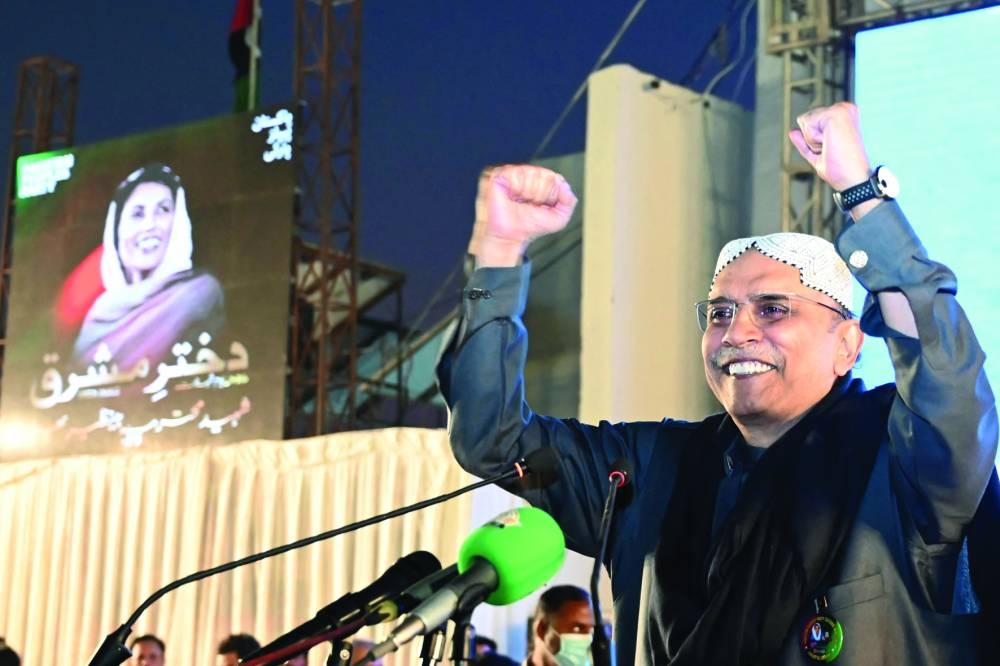Asif Ali Zardari, the widower of Pakistan’s slain first female leader Benazir Bhutto, was voted in as president for a second time on Saturday, after elections marred by rigging claims.
Zardari was voted in with 411 votes to 181 for the opposition-backed candidate, the Election Commission of Pakistan announced after tallying the votes by national MPs, provincial MPs and senators.
Lawmakers of Bhutto’s Pakistan People’s Party (PPP) voted Zardari into the largely ceremonial post, backed by the Pakistan Muslim League-Nawaz (PML-N) party in an alliance forged after the February 8 polls.
Under the terms of the coalition pact, which also includes a handful of smaller parties, PML-N’s Shehbaz Sharif was sworn-in as prime minister on Monday.
Zardari is expected to be sworn in at a ceremony today.
Pakistan’s February 8 election was tainted by allegations of massive pre-poll rigging and vote tampering, with former prime minister Imran Khan jailed and barred from contesting and his Pakistan Tehreek-e-Insaf (PTI) party targeted by arrests and censorship, with members forced to stand as independents.
They defied expectations to win more seats than any other party last month, but fell far short of the majority needed to govern — clearing the way for the alliance between PML-N and PPP.
However, PTI claim a polling day mobile Internet blackout and a massive delay in results were used to cover up nationwide rigging preventing their landslide victory.
Khan’s party was later denied its share of reserved seats for the National Assembly and its seats were distributed among the coalition by the Election Commission on grounds that it no longer stood as a party — the irony lay in how the Commission itself was a party in a case before the country’s apex court and won a controversial verdict to snatch the party’s election symbol.
PTI nominated Mehmood Khan Achakzai, a lawmaker from the western city of Quetta, as their presidential candidate.
Zardari, 68, has spent more than 11 years in jail, a long time even by the standards of Pakistani politicians. But he has a reputation for bouncing back from scandals that might prove career-ending for others. As the PPP’s patriarch he is expected to steer his party through a coalition analysts regard as shaky after the fraught results of last month’s election.
Initially a background character as Bhutto’s consort, Zardari was stained by a bevy of corruption and other allegations, including absurd kidnapping plots and taking kickbacks lavished on hoards of jewellery. Despite a reputation as “Mr. Ten Percent” — the alleged cut he took for rubber-stamping contracts — a sympathy vote propelled him to office when his wife was assassinated in a 2007 bomb and gun attack. Between 2008 and 2013, he ushered in constitutional reforms rolling back presidential powers, and the 68-year-old’s second term will see him steer a largely ceremonial office.
Back in 2009, the New York Times said he had a knack for “artful dodging” — “manoeuvring himself out of the tight spots he gets himself into”. Zardari was born in 1955 into a land-owning family from the southern province of Sindh.
“As a child, I was spoilt by my parents as an only son,” he said in a 2000 interview with The Guardian newspaper. “They indulged my every whim.”
He expressed only limited political ambitions as a young man — losing a 1983 local government election. It was his 1987 arranged marriage with PPP leader Bhutto that earned him a spot in the political limelight.
Their union — brokered by Bhutto’s mother — was considered an unlikely pairing for a leader-in-waiting from one of Pakistan’s major political dynasties.
Bhutto was an Oxford and Harvard graduate driven by the desire to oust then-strongman General Zia-ul-Haq, who forced her father from the prime minister’s office and had him executed.
Zardari was a university dropout with a reputation for brawling, partying and romancing women at a private disco in his family home.
On the eve of their wedding, Bhutto’s team issued a formal statement denying he was “a playboy who plays polo by day and frequents discos at night”.
Their nuptial celebrations were dubbed the “people’s wedding” — doubling as a political rally in the megacity of Karachi, where a crowd of 100,000 fervently chanted PPP slogans.
Initially, Zardari pledged to keep out of politics. PPP insiders regarded Zardari as a liability, considering him likely to embarrass her leadership.

Pakistan Peoples’ Party leader Asif Ali Zardari gestures to supporters during a campaign rally for the 2024 General Elections in Larkana. (AFP)
